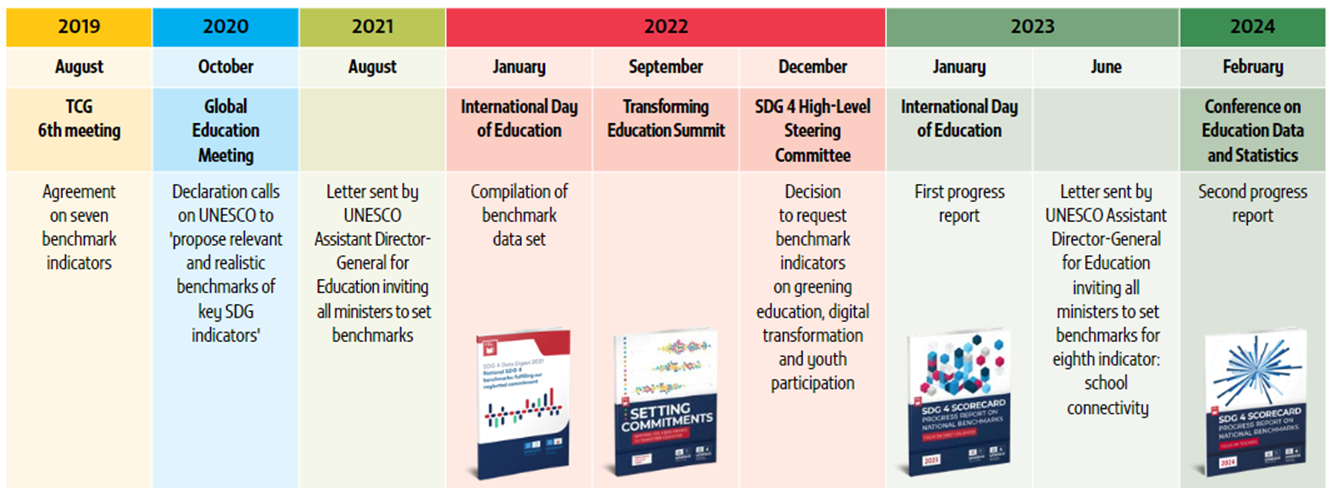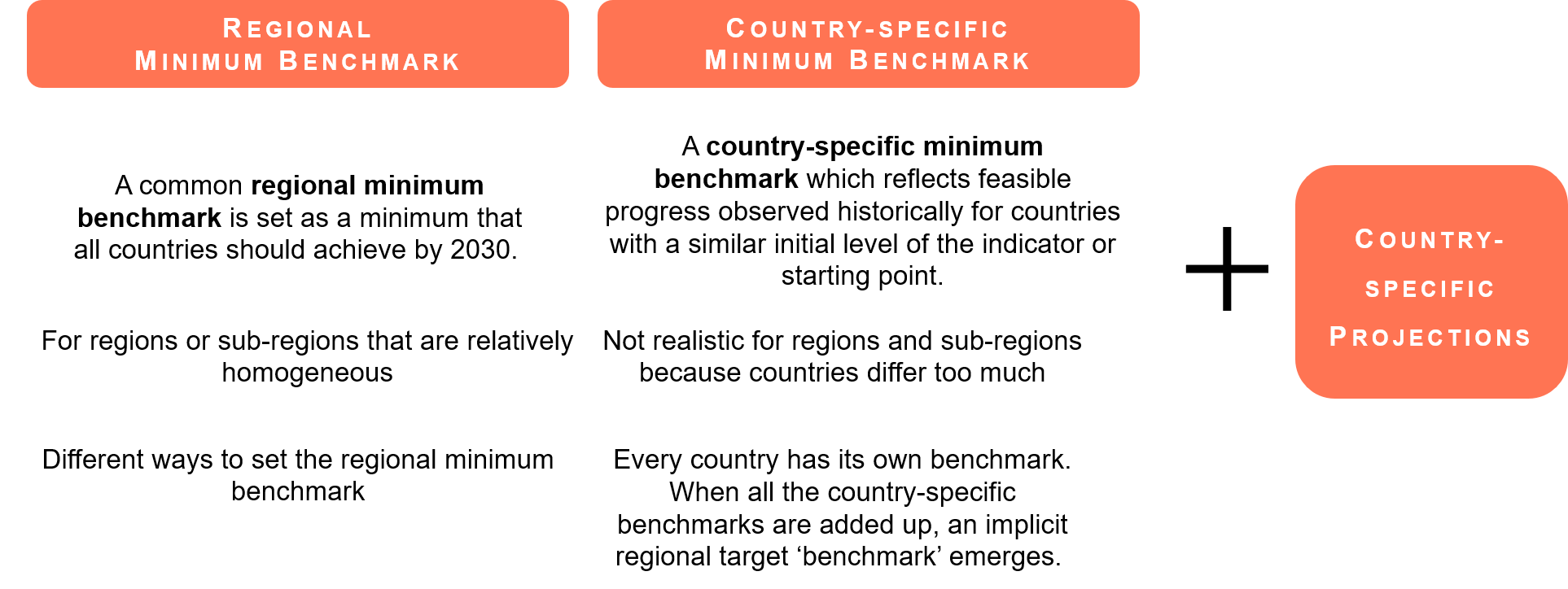Benchmarks
What are benchmarks?
Benchmarks are targets set by countries for a number of selected education indicators for 2025 and 2030. They reflect a country’s contribution to the global SDG4 agenda; take into account a country’s starting point and rate of progress; and should ideally be based on national education sector plans or regional plans.
What are the objectives of setting benchmarks?
• Make countries accountable for their commitments towards the common global education agenda
• Contextualize monitoring of progress to reflect a country’s aspirations
• Link national, regional and global education agendas, to ensure coherence and mutual understanding of the different contexts
• Focus attention on data gaps in key indicators
• Strengthen national planning processes and highlight the importance of setting targets in national plans
• Prompt exchanges on challenges and good practices, promote mutual learning, and provide evidence for policy reforms and collective initiatives
SDG 4 Scorecard dashboard
Publications
- SDG 4 Scorecard: Progress report on national benchmarks
- Brochures
- SDG 4 Benchmarks Database Integration
- Blogs
Data products
Benchmarks data gaps
Timeline of SDG4 Benchmarking process

The extraordinary session Global Education Meeting in October 2020 reminded countries of their commitment to the Declaration, which called on “UNESCO and its partners, together with the SDG-Education 2030 Steering Committee, to … accelerate the progress and propose relevant and realistic benchmarks of key SDG 4 indicators for subsequent monitoring” (§10).
The effectiveness of the process to set, monitor, and act on benchmarks rests on two factors:

In response, countries and international governmental organisations have designed regional education plans to articulate the SDG 4 Targets.
The main objective of benchmarks is to draw attention to data gaps and introduce a coordinated mechanism to flag countries that may be falling behind in terms of certain key indicators.
The technical process for setting regional benchmarks is briefly presented here and is explained in greater detail in the following paper: Benchmarks for SDG 4 Indicators: A Political and Technical Basis for Discussion.
Proposed interim national benchmarks
Until countries select their own benchmark for each of the seven SDG 4 Indicators, the following interim national benchmark approach is proposed.
Despite the fact that the two approaches differ, regions could opt for a variation that includes both approaches. The need for countries to take an active role in setting their benchmarks is envisaged in the Framework for Action.

Find out more here.
Orientation Sessions have been offered to Members States of all regions as support for the establishment of national benchmarks values for SDG 4 Indicators for 2025 and 2030.
Presentations
On 13 July 2021, the global community convened at the 2021 Global Education Monitoring Meeting - Ministerial Segment and invited Member States to
submit national benchmarks on the seven SDG 4 - Education 2030 benchmarking indicators for UNESCO to compile and present at the
High-Level Segment of the Global Education Meeting in November 2021.
Find out more about the 2021 Global Education Monitoring Meeting and view the GEMR and UIS PPT presentation.
The UIS and the Chair of the UIS governing board convened the Norwegian Agency for Development Cooperation (NORRAD), the German Gesellschaft für Internationale Zusammenarbeit (GIZ), Bill and Melinda Gates Foundation and UNICEF to discuss the SDG 4 benchmarking exercise, and donors and partners roles on 17 February 2021.
Various areas were discussed and explored:
- Use the UIS benchmark dashboard to identify data gaps and drive coordinated investment in solutions;
- Identify where commitment and capacity need to be strengthened; and
- Identify the potential of regional data coordination initiatives to enable political engagement on data issues.
Presentation
Following the calls of the UN Secretary-General in 2014 to embrace ‘a culture of shared responsibility’ based on ‘benchmarking for progress’ and the Education 2030 Framework for Action in 2015 to establish ‘appropriate intermediate benchmarks’ to monitor progress in education, countries commited to set national benchmarks for seven selected indicators for 2025 and 2030.
The Technical Cooperation Group on SDG 4 indicators (TCG) played a major role in helping countries fulfil this long-neglected commitment by working very closely with them. The TCG identified the benchmark indicators, set regional benchmark values in collaboration with regional organizations, proposed minimum and feasible national benchmark values and offered assistance to countries throughout the process. The TCG developed methodologies as well as capacities at the national level, and offered an array of resources (benchmark templates, publications, websites and workshops).
Find out more about the TCG decisions related to the benchmarking process